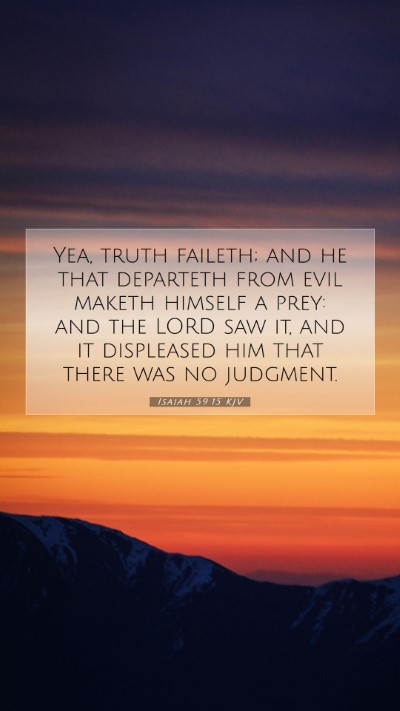Understanding Isaiah 59:15
Isaiah 59:15 presents profound themes of justice, truth, and the consequences of sin. This verse reads:
"Yea, truth faileth; and he that departeth from evil maketh himself a prey: and the LORD saw it, and it displeased him that there was no judgment."
Bible Verse Meanings and Interpretations
This verse highlights the lament of the prophet Isaiah regarding the moral decay in society. The abandonment of truth leads to a failure of justice, indicating a serious spiritual and social crisis.
Historical Context
Understanding the historical context is essential in scripture analysis. In Isaiah's time, the nation of Israel faced numerous challenges, including external threats and internal corruption. The people's departure from God's commands resulted in a breakdown of societal norms.
Key Themes in Isaiah 59:15
- Truth and Justice: The mention of truth failing suggests that integrity and morality are vital for a society's health. Without these, justice cannot prevail.
- The Cost of Righteousness: The phrase "maketh himself a prey" indicates that those who pursue righteousness may face persecution or dangers.
- God’s Displeasure: The verse concludes with God’s observation of the situation, emphasizing His concern for justice and His disappointment in humanity's choices.
Bible Verse Commentary
Public domain commentaries provide further insights into Isaiah 59:15:
Matthew Henry's Commentary
Matthew Henry emphasizes the moral desolation of society. He points out that the absence of truth leads to injustice, as people do not recognize right from wrong. He notes that believers must remain steadfast in righteousness, even when it leads to feeling isolated or threatened.
Albert Barnes' Notes
Albert Barnes elaborates on the dangers of abandoning virtue. He explains that straying from goodness positions individuals against God's justice. Barnes highlights that God’s displeasure signifies the importance of accountability and divine justice.
Adam Clarke's Exposition
Adam Clarke discusses the relationship between truth and righteousness. He interprets the phrase "maketh himself a prey" as an indication that those who uphold truth may be targeted, yet Clarke underscores the necessity of maintaining one's integrity regardless of the worldly consequences.
Application and Implications
This verse has contemporary applications as it echoes the struggles of individuals striving for moral integrity in a culture often indifferent to truth. Believers are called to:
- Seek truth actively, knowing it is foundational to justice.
- Stand firm against injustices, understanding that righteousness may attract opposition.
- Recognize God’s perspective on societal issues, remaining engaged in promoting His values.
Cross References
Related Bible verses that enhance the understanding of Isaiah 59:15 include:
- Proverbs 14:12: "There is a way that seems right to a man, but in the end, it leads to death."
- Psalm 94:16: "Who will rise up for me against the wicked? Who will take a stand for me against evildoers?"
- Micah 6:8: "He has shown you, O mortal, what is good. And what does the Lord require of you? To act justly and to love mercy and to walk humbly with your God."
Further Biblical Exegesis
Isaiah 59:15 encourages in-depth Bible study and understanding scripture within its full context. It addresses themes such as:
- Understanding Difficult Bible Passages: This verse exemplifies complex themes in scripture requiring careful interpretation.
- Applying Bible Verses to Daily Life: Believers are prompted to consider how this verse shapes their approach to modern issues of justice and morality.
Conclusion
In interpreting Isaiah 59:15, we discover the critical nature of truth and justice in our relationship with God. The commentary provided by esteemed theologians aids in deepening our understanding of this powerful scripture, encouraging reflection on our own lives, and fostering a desire for righteousness amidst challenges.


